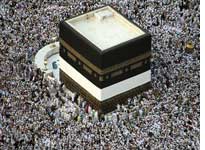Baithak Desi Apr 27: Governance. Centres of Power, Ayesha Haq, Jirgas, Zia Mohyeddin, Anjum Niaz, Cowasjee, Moderate Muslim/s, Saqi Farooqui, Z
In principle the bureaucracy should be subservient to the elected civilians. In civilised democracies they are. In Quaid's Pakistan, that is how it was envisioned. But over the past 60 years this tradition has not be nurtured. It should be recalled here that the 'civilian' government needs bureaucrats and elected LB (Local Bodies) Nazims to carry out its writs. If they alienate both of them they will create obstacles in their own way. Internally, such abrupt moves do not give out right signals.
The News Editorial Behind the scenes talks of "centre of power"
The uncertainty and fluidity in Pakistani scenario is exacerbated. We know the reasons - lack of institutions, continuous military intervention, spineless judiciary (doctrine of necessity etc...)
Even after the recent elections the centre of power is spread allover (in no particular order) with:
* Zardari House
* Sharif Estate
* Army Camp House
* NA
* Kayani
* Agencies and assorted interest groups
Ayesha Haq writes: Restoration of the judges coupled with a constitutional package that seeks to undermine the independence of the judiciary will be as dark an action as that taken on November 3 by General Musharraf. Judicial control packaged as judicial reform will not wash. Our politicians may have wiped the slate clean with the NRO, but if we are to have any kind of future, then we don"t just need, we demand an independent judiciary so that we never have to enact another NRO.
My response? "Business as usual.";)
Jirga and Alternate Justice Delivery
With the backlog in court systems minor cases can be delivered by the jirgas/panchayat systems as long as care is taken they do not infringe on CPC and do not award capital punishment, deal with karo kari, watta-satta and corporeal punishments without consultation of the courts.
Zia Mohyeddin column Not with a bang but a whimper
Viva young! By Anjum Niaz
Dear Anjum:
Since you suggest Young Turks I have two queries:
1: How old was Benazir ( the first time around)?
2: How old was Nawaz (again, the first time around)?
:)
The city nazim, Mustafa Kamal, subsequently on April 25 has asserted his legal right to control the city through the provisions of the prevailing SLGO, 2001. He is within the law; he rightfully does not wish the KBCA and KWSB to be kidnapped. He is hardworking and he is apparently honest. We should support him. By Ardeshir Cowasjee

Last December, more than 2 million Muslims from around the world converged on Saudi Arabia to participate in the Hajj, the annual pilgrimage to the holy site of Mecca. The Hajjis spent a month performing religious rituals, mingling with Muslims from all walks of life, and, in some cases, taking part in communal chants of "Death to America" led by Islamic extremists. This was understandably unnerving to the 10,000 or so Americans who made the pilgrimage, not to mention those who didn't. Such behavior raised concerns that the Hajj is a breeding ground for anti-Western sentiment—or worse.
Then again, the spirit of friendship and community that typically prevails during the Hajj has also been known to promote tolerance and understanding across peoples. Malcolm X famously softened his views on black-white relations during his pilgrimage to Mecca, where he witnessed a "spirit of unity and brotherhood that my experiences in America had led me to believe never could exist between the white and non-white."
So does the Hajj open minds, or does it expose Muslims to radical views that unite them against the non-Islamic world? To find out, researchers David Clingingsmith, Asim Khwaja, and Michael Kremer surveyed more than 1,600 Pakistanis, about half of whom went on the Hajj in 2006. In a recent, as yet unpublished study, they report that those who went to Mecca came back with more moderate views on a range of issues, both religious and nonreligious, suggesting that the Hajj may be helpful in curbing the spread of extremism in the Islamic world. Does going to Mecca make Muslims more moderate? By Ray Fisman
BOOK REVIEW: Saqi’s unrepentant sinfulness by Khaled Ahmed
 Aap-Beeti/Paap-Beeti;
Aap-Beeti/Paap-Beeti;By Saqi Farooq;
Akademi Bazyaft Karachi 2008;
Pp176; Price Rs 300
Saqi’s gravitation to Habib Jalib was natural in a way too because he saw the anarchist in him where others saw a revolutionary, and the quarrels that took place were incidental to the way they related
You don’t know what kind of irreverent sinner you are up against in this book till I have told what he did in his earlier book titled Hajibhai Paniwala. This was also the main poem in the collection and Paniwala was not the shopkeeper who sold water but he was so called because there was water in his testicles. He sat squatting with his enormous waterlogged genitals in front of him covered with cloth like a table; in fact, he packed the spices on top of them.
Saqi understood the Salim Ahmad he revered as an endlessly creative person who, instead of forward, went backward, like Muhammad Hasan Askari and Akbar Ilahabadi before him, into what can be described as an unoriginal religious recidivism. The persons he most admired without finding chinks in them were Jamil Jalibi and Mushfiq Khwaja. Jalibi, with his ready-for-others car and his official capacity in the revenue department, impressed with his persistent humanity and devotion to chronicling Urdu literature. Mushfiq Khwaja, ‘the man of the manuscripts’, was more subtle in doing what Saqi has done to Urdu with insult: mourn the death of creativity in Urdu literature after 1947 with a belle-lettres humour.
ZAHOOR'S CARTOON:




0 Comments:
Post a Comment
<< Home